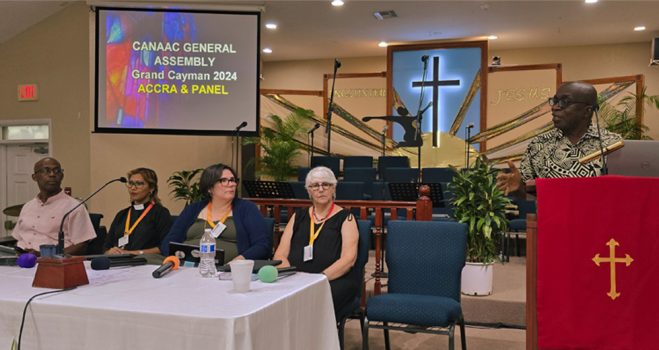The World Communion of Reformed Churches (WCRC), together with the Caribbean and North American Area Council (CANAAC) and the United Church in Jamaica and the Cayman Islands, convened over 50 leaders and delegates specifically from the CANAAC region to commemorate “Accra Plus Twenty CANAAC.” This consultation was part of a series of regional consultations organized by the WCRC celebrating the 20th anniversary of the influential Accra Confession during the CANAAC Assembly taking place from October 26 – 30, 2024.
The gathering took place at Savannah United in Grand Cayman, providing a reflective and energizing platform on Reformation Sunday to honor the Confession’s legacy of economic and environmental justice and inspire renewed commitments for an equitable and hopeful future.
WCRC President Najla Kassab opened the event, stating, “As we celebrate twenty years of the Accra Confession, we remember both the successes and the ways in which we have yet to fully live out its prophetic call. Today, we covenant again for justice in the economy and in the Earth.”
Key Themes and Visions for a Just Future
Through a series of panel discussions, the event delved into the intersections of faith, justice, and systemic inequality, exploring both progress and areas of continued need:
Missiological Implications of the Accra Confession – Rev. Dr. Collin Cowan highlighted the Confession’s origins as a “prophetic declaration” against the destructive effects of economic globalization, underscoring the need to address “the systemic marginalization of women and other oppressed groups.”
Indigenous Reflections on the Accra Confession – Rev. Dr. Carmen Lansdowne offered an Indigenous perspective, stressing the importance of inclusive justice frameworks and a shared aspiration for a compassionate, joy-filled future: “What if, in our reforming of the church, we took a play from Jesus’s playbook and, as we witness the dehumanizing experiences of the most oppressed, we also aspire to no more killing? We aspire to joy, to gratitude…What if we promoted the world that is possible when we persevere in our witness, knowing that we can, in fact, do all things through Christ?”
Gender Perspectives on the Accra Confession – Rev. Dora Arce Valentin highlighted gender-specific struggles, declaring, “As we celebrate the 20th anniversary of a milestone in the Ecumenical Movement, the integrity of our faith in God and our discipleship as Christians, we must reinforce theological reflection with perspectives derived from feminist, queer, Black, Indigenous voices, and others directly affected by humanity’s injustices.”
Youth Engagement and an Economy of Care – Youth leader Rev. Sanya Beharry championed the concept of an Economy of Care, advocating for a society focused on meeting the needs of all. “In our world, caregiving is largely carried out by women, whether for our elderly or our children. This Economy of Care shifts our focus to the well-being of everyone, creating an economy of hope. Imagine how different our world could be if we prioritized care and support for all.”
Roderick Hewitt, reflecting on Reformed tradition’s commitment to economic justice, added, “Economic issues have been part of the fabric of Reformed identity. Reformed theologies have always sought to ensure that people experience the fullness of life, which remains a perennial struggle for our communion.”
Renewed Commitment to Justice for Future Generations
The day concluded with a resounding reaffirmation of commitment to economic justice, environmental stewardship, and a shared vision for an inclusive future. General Secretary Setri Nyomi emphasized, “The Accra Confession calls us to a shared journey toward justice. Today, we recommit to that journey with a renewed focus on inclusivity and justice.”
The “Accra Plus Twenty” consultation left delegates with a collective resolve to amplify the Reformed community’s prophetic voice against inequality, particularly where it affects vulnerable populations worldwide. With a steadfast faith, attendees envisioned a world where economic and ecological decisions prioritize people and the planet, embodying hope and peace beyond human understanding.
This historic gathering reminded the Reformed community of the ongoing call to uphold justice and opened the way for a sustained journey toward a compassionate, equitable, and hopeful world.


